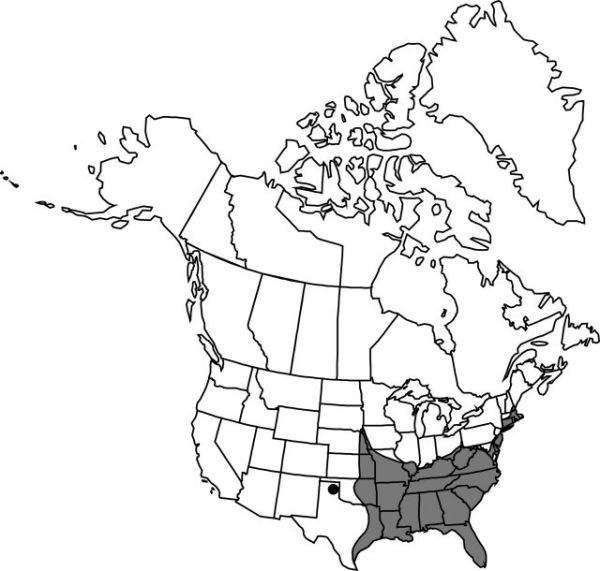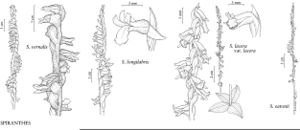Difference between revisions of "Spiranthes vernalis"
Boston J. Nat. Hist. 5: 236. 1845.
FNA>Volume Importer |
imported>Volume Importer |
||
| (6 intermediate revisions by 2 users not shown) | |||
| Line 6: | Line 6: | ||
|place=5: 236. 1845 | |place=5: 236. 1845 | ||
|year=1845 | |year=1845 | ||
| + | }} | ||
| + | |special_status={{Treatment/ID/Special_status | ||
| + | |code=F | ||
| + | |label=Illustrated | ||
| + | }}{{Treatment/ID/Special_status | ||
| + | |code=E | ||
| + | |label=Endemic | ||
}} | }} | ||
|basionyms= | |basionyms= | ||
| Line 11: | Line 18: | ||
|name=Ibidium vernale | |name=Ibidium vernale | ||
|authority=(Engelmann & A. Gray) House | |authority=(Engelmann & A. Gray) House | ||
| + | |rank=species | ||
}} | }} | ||
|hierarchy=Orchidaceae;Orchidaceae subfam. Orchidoideae;Orchidaceae tribe Cranichideae;Orchidaceae (tribe Cranichideae) subtribe Spiranthinae;Spiranthes;Spiranthes vernalis | |hierarchy=Orchidaceae;Orchidaceae subfam. Orchidoideae;Orchidaceae tribe Cranichideae;Orchidaceae (tribe Cranichideae) subtribe Spiranthinae;Spiranthes;Spiranthes vernalis | ||
| Line 26: | Line 34: | ||
|elevation=0–1000 m | |elevation=0–1000 m | ||
|distribution=Ala.;Ark.;Conn.;Del.;D.C.;Fla.;Ga.;Ill.;Ind.;Iowa;Kans.;Ky.;La.;Md.;Mass.;Miss.;Mo.;Nebr.;N.H.;N.J.;N.Y.;Ohio;Okla.;Pa.;R.I.;S.C.;Tenn.;Tex.;Va.;W.Va. | |distribution=Ala.;Ark.;Conn.;Del.;D.C.;Fla.;Ga.;Ill.;Ind.;Iowa;Kans.;Ky.;La.;Md.;Mass.;Miss.;Mo.;Nebr.;N.H.;N.J.;N.Y.;Ohio;Okla.;Pa.;R.I.;S.C.;Tenn.;Tex.;Va.;W.Va. | ||
| − | |discussion=<p>The habit of Spiranthes vernalis is variable: inflorescences range from secund to loosely and even densely coiled, and flower shapes vary as well. The most consistent diagnostic character is the presence in inflorescences of copious articulate, pointed trichomes that readily distinguish S. vernalis from similar species.</p> | + | |discussion=<p>The habit of <i>Spiranthes vernalis</i> is variable: inflorescences range from secund to loosely and even densely coiled, and flower shapes vary as well. The most consistent diagnostic character is the presence in inflorescences of copious articulate, pointed trichomes that readily distinguish <i>S. vernalis</i> from similar species.</p> |
|tables= | |tables= | ||
|references= | |references= | ||
| Line 35: | Line 43: | ||
-->{{#Taxon: | -->{{#Taxon: | ||
name=Spiranthes vernalis | name=Spiranthes vernalis | ||
| − | |||
|authority=Engelmann & A. Gray | |authority=Engelmann & A. Gray | ||
|rank=species | |rank=species | ||
| Line 49: | Line 56: | ||
|publication title=Boston J. Nat. Hist. | |publication title=Boston J. Nat. Hist. | ||
|publication year=1845 | |publication year=1845 | ||
| − | |special status= | + | |special status=Illustrated;Endemic |
| − | |source xml=https:// | + | |source xml=https://bitbucket.org/aafc-mbb/fna-data-curation/src/2e0870ddd59836b60bcf96646a41e87ea5a5943a/coarse_grained_fna_xml/V26/V26_1083.xml |
|subfamily=Orchidaceae subfam. Orchidoideae | |subfamily=Orchidaceae subfam. Orchidoideae | ||
|tribe=Orchidaceae tribe Cranichideae | |tribe=Orchidaceae tribe Cranichideae | ||
Latest revision as of 21:11, 5 November 2020
Plants 20–65 cm. Roots numerous, spreading, mostly to 1 cm diam., stout. Leaves persisting through anthesis, to 4–5, basal, reduced to sheathing bracts upward on stem, spreading, linear-lanceolate, keeled, 5–25 × 1 cm. Inflorescences: spikes loosely to tightly spiraled, 3–7 or more flowers per cycle of spiral, sometimes nearly secund; rachis densely pubescent, trichomes articulate, pointed, capitate glands absent. Flowers nodding to somewhat ascending, white to cream, mostly gaping; sepals distinct to base, lanceolate, 6–10 × 2–3 mm; lateral sepals spreading; petals oblong, 6–9 × 2 mm, apex obtuse; lip creamy yellow centrally or some individuals with 2 brown-orange spots, ovate, 5–8 × 4 mm; veins of lip straight, branches parallel; basal calli conic, to 1 mm; viscidium linear-lanceolate; ovary mostly 8 mm. Seeds monoembryonic. 2n = 30.
Phenology: Flowering Jan (Fla)–Oct (north).
Habitat: Dry to moist meadows, dune hollows, prairies, old fields, roadsides, cemeteries, lawns
Elevation: 0–1000 m
Distribution

Ala., Ark., Conn., Del., D.C., Fla., Ga., Ill., Ind., Iowa, Kans., Ky., La., Md., Mass., Miss., Mo., Nebr., N.H., N.J., N.Y., Ohio, Okla., Pa., R.I., S.C., Tenn., Tex., Va., W.Va.
Discussion
The habit of Spiranthes vernalis is variable: inflorescences range from secund to loosely and even densely coiled, and flower shapes vary as well. The most consistent diagnostic character is the presence in inflorescences of copious articulate, pointed trichomes that readily distinguish S. vernalis from similar species.
Selected References
None.
